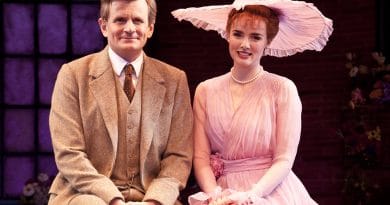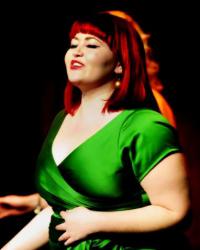Linden Furnell on breaking musical theatre convention in American Idiot
Linden Furnell is a lover of dense lyricism and lush orchestrations in the vein of Jason Robert Brown and Adam Guettel, but also believes that American Idiot has allowed him the emotional freedom and rawness as a performer to break free of the theatre conventions that often restrict him.
Ahead of American Idiot‘s national tour, we spoke to Furnell about reconciling the punk rock sound of Green Day against the typical mainstage musical theatre show, how he monitors the intense energy of his character in front of an audience, and what we can learn from a show that champions impulsivity over perfection.

Members of the original Broadway cast of American Idiot called this show an “assault”, have you had to adjust the way you move your body or your voice to protect yourself against any of the visceral material?
Having a background in rock music and playing gigs with some original music has equipped me pretty well in terms of vocal preservation and stuff like that. The show is pretty high energy and I get jigged up with this style of music – I’m gonna have a lot of fun, I’m going to sweat a lot – so there is an ongoing challenge that I’m using every day as an opportunity to build stamina. I know that as soon as we get an audience in front of us that energy is going to be ramped up double, and when that happens (as every theatre person knows), your technique can drop out from under you, you get a bit loose and you forget to support your voice and place it is safe positions and you end up sort of having fun and yelling and screaming, which obviously isn’t sustainable for a long run. There’s a process in me in gauging how much energy I can expel and how reckless and loose I can get physically without compromising my vocal stamina. […] the material itself is kind of well suited for me, it’s been a case of how far I can push it and sustain it. The challenge will be energy economy. The show is pretty assaulting, but in a fun, explosive way.
I think those kinds of things are draining, but they’re also really cathartic. I really like these roles that go through a turbulent emotional experience, because you often get to experience a pretty big resolve.
Can you talk to me about Johnny, the character you play in American Idiot?
Johnny is in kind of a stunted, arrested emotional development. He’s probably mid-twenties, but he’s a bit of a dero, still lives with his folks, still sort of leeches from society, and self-loathes as a result. He knows that he’s a burden like his contemporaries in this generation, so there’s an immaturity in Johnny.
Johnny is an interesting exploration of frankly, some kids I grew up with in the western suburbs. I’d hang out with them, because I was homeschooled for a while. I’d get my BMX bike and go biking with them, smoking, underage drinking, but I’ve gone out and ended up in theatre. Some of these guys, I kind of have a lense into their life through Facebook. They’re in their late 20s and still don’t know what the fuck they’re doing, you know? It’s sort of an interesting portal into Johnny, into the purposelessness, and the question of, “where’s my people, where’s my community?”
I’ve spoken to gig musician friends and pop/rock/punk fans who can’t unify the idea of Green Day music and musical theatre in their minds. What would you say to the people who look down on the idea?
I was one of those people at first. I’m a big fan of lush orchestrations and dense lyricism, JRB, Adam Guettel, Sondheim. I also grew up on Green Day, Sum 41, and Blink, so I love the sonic world, I love the sound, the energy, the rawness of the punk world in a big way. My doubts were if there was enough of a palette in American Idiot to tell stories, because [the album] is power chords on a guitar, you have a very limited sound palette to work with emotionally, whereas your typical musical has strings, percussion, you have piano and immense harmonic potential. You just don’t have that here, all you’ve got is the grind of guitar and voices.

There’s enough diversity in it, the rearrangements have helped a lot. I think if you lifted the Green Day album directly off its feet and stuck it on stage I’d probably get a little ear-bored, but they’ve re-worked the songs and brought out [something new], they’ve re-harmonised some of the songs a little and moved them around for different voices, so there’s all of these ethereal sounds that weren’t part of the album originally but still work within the songs. I think that’s a big part of what makes it work, theatrically. You won’t get the beautiful musical nuance you would get in a Jason Robert Brown show, but at the same time, you won’t get the thumping emotional power of American Idiot in any other kind of musical theatre show.
There’s very few musicals that hit this hard, have blaring guitars, have drums smashing the crash and loud snares and stuff, it brings out a real animalistic sort of feeling in you. Some musicals are never going to get that.
Rock and roll fans are coming in and saying, “fuck, I didn’t think I would be so moved.” They are getting the power [of the music they love], and an emotional journey through the characters, too.
Is there a benefit in bringing the work of artists outside the musical theatre genre into our world? Can musical theatre artists learn anything from music from people like Green Day?

Broadway [can be] like a giant band, you’ll recognise some of the same chord shapes and musical flavours repeated throughout shows. It’s like they’re just different albums over decades, but essentially you have this same sort of sound. Then you get a group like Green Day, who don’t give a fuck really about what they sound like compared to other people, and their lyrics are unfiltered, a little bit raw, a little sloppily written at times, but straight from the heart or the head. They’re not beautifully refined or crafted so the rhyme scheme is perfect, like a lot of musical theatre is. In musical theatre, there’s this obligation to be a bit witty lyrically (which I love, don’t get me wrong) but I think when writers try to be witty and clever they trade a bit of that impulse, the gold of that first impulse, which a show like American Idiot has more of. It’s a little bit rough around the edges, but [what you sing] is the first thing that comes to your head.
Can you give me a few words on what American Idiot means to you?
Some theatre can be a little stifling, contrived, phony in a lot of ways. American Idiot is a chance for me to be honest, raw, impulsive and true to myself as a performer. It’s sort of cathartic, it’s a conduit to finding me as a performer again. I’ve spent time working in theatre trying to cram myself into a box I didn’t fit into, and then this show came up and I was like, “FUCK YES!” American Idiot is a chance for me to bust back out of this musical theatre box that I’ve sometimes felt crushed by.
The rage and love of American Idiot can be seen in Melbourne from Friday night, before touring to Brisbane and Darwin later in the year. Tickets can be found at this link.




